
-
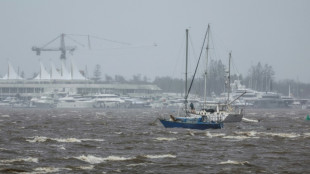 Wild weather leaves mass blackouts in Australia
Wild weather leaves mass blackouts in Australia
-
China consumption slump deepens as February prices drop

-
 Phone bans sweep US schools despite skepticism
Phone bans sweep US schools despite skepticism
-
Some 200 detained after Istanbul Women's Day march: organisers

-
 'Grieving': US federal workers thrown into uncertain job market
'Grieving': US federal workers thrown into uncertain job market
-
Remains of murdered Indigenous woman found at Canada landfill

-
 Women will overthrow Iran's Islamic republic: Nobel laureate
Women will overthrow Iran's Islamic republic: Nobel laureate
-
Women step into the ring at west African wrestling tournament

-
 Trump's tariff rollback brings limited respite as new levies loom
Trump's tariff rollback brings limited respite as new levies loom
-
Hackman died of natural causes, a week after wife: medical examiner
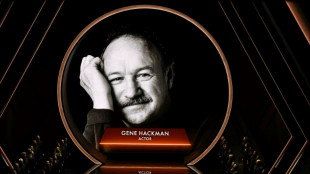
-
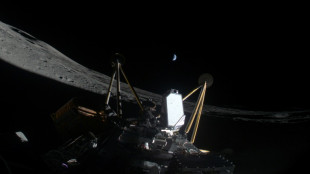 Oops, we tipped it again: Mission over for sideways US lander
Oops, we tipped it again: Mission over for sideways US lander
-
Cyclone Alfred downgraded to tropical low as it nears Australia

-
 Global stocks mixed as Trump shifts on tariffs weighs on sentiment
Global stocks mixed as Trump shifts on tariffs weighs on sentiment
-
Trump says dairy, lumber tariffs on Canada may come soon

-
 Trump cuts $400 mn from Columbia University over anti-Semitism claims
Trump cuts $400 mn from Columbia University over anti-Semitism claims
-
US Fed chair flags policy uncertainty but in no rush to adjust rates

-
 Adopted orphan brings couple 'paradise' in war-ravaged Gaza
Adopted orphan brings couple 'paradise' in war-ravaged Gaza
-
Oops, we tipped it again: Mission over for private US lander
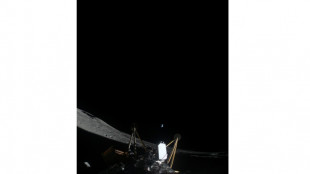
-
 Greenland's mining bonanza still a distant promise
Greenland's mining bonanza still a distant promise
-
Pope 'stable' as marks three weeks in hospital with breathless audio message

-
 Shares slump on Trump tariffs tinkering, jobs
Shares slump on Trump tariffs tinkering, jobs
-
Mission over for private US lander after wonky landing
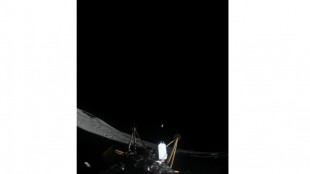
-
 Thousands stranded as massive WWII bomb blocks Paris train station
Thousands stranded as massive WWII bomb blocks Paris train station
-
UK court cuts longest jail terms on activists, rejects 10 appeals

-
 US hiring misses expectations in February as jobs market faces pressure
US hiring misses expectations in February as jobs market faces pressure
-
S.Sudan heatwave 'more likely' due to climate change: study

-
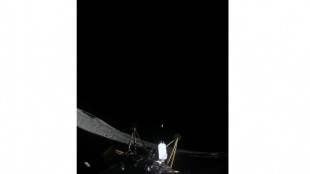 US company says Moon mission over after landing sideways again
US company says Moon mission over after landing sideways again
-
Trump says farmers keen to quit 'terrible' S. Africa welcome in US

-
 US stock markets rise as investors track Trump tariffs, jobs
US stock markets rise as investors track Trump tariffs, jobs
-
US hiring misses expectations in February, jobs market sees pressure

-
 Disco, reggae on King Charles's 'eclectic' Apple playlist
Disco, reggae on King Charles's 'eclectic' Apple playlist
-
Australian casino firm strikes deal to avoid liquidity crunch

-
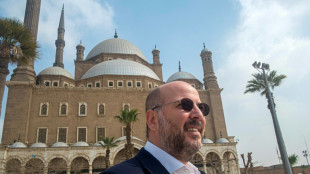 Deposed king's grandson makes low-key return to Egypt
Deposed king's grandson makes low-key return to Egypt
-
Stock markets, bitcoin down as Trump policies roil markets

-
 Bangladesh student leader aims to finish what uprising began
Bangladesh student leader aims to finish what uprising began
-
Japan, Britain stress free trade in Tokyo talks

-
 Spain targets men's 'deafening silence' in gender violence battle
Spain targets men's 'deafening silence' in gender violence battle
-
Spain under pressure to abort nuclear energy phase-out

-
 Hungary femicide sparks outcry on gender violence
Hungary femicide sparks outcry on gender violence
-
Trial of Maradona's medics to start four years after star's death

-
 Women spearhead maternal health revolution in Bangladesh
Women spearhead maternal health revolution in Bangladesh
-
Apple step closer to seeing end of Indonesia iPhone sales ban

-
 China's exports start year slow as US trade war intensifies
China's exports start year slow as US trade war intensifies
-
Asian stocks, bitcoin down as trade uncertainty roils markets

-
 China tariffs aimed at Trump fan base but leave wiggle room
China tariffs aimed at Trump fan base but leave wiggle room
-
Musk's SpaceX faces new Starship setback

-
 Trump signs executive order establishing 'Strategic Bitcoin Reserve'
Trump signs executive order establishing 'Strategic Bitcoin Reserve'
-
Australian casino firm scrambles for cash to survive

-
 Musk's SpaceX faces setback with new Starship upper stage loss
Musk's SpaceX faces setback with new Starship upper stage loss
-
US and European stocks gyrate on tariffs and growth


Primark boss defends practices as budget fashion brand eyes expansion
Ireland-based budget fashion chain Primark has been criticised for its record on workers' rights and the effect of its low-cost, high-volume model on the environment.
But its chief executive Paul Marchant does not agree. "I don't buy the story that we can't be ethical buying from Asia," he told AFP in an interview in Dublin.
In the world of low-cost fashion, Primark -- a fixture on the high street in the UK, Ireland and beyond -- is a one-off.
The brand produces its garments in Asia and sells them cheaply in Europe, but ships them by boat rather than by plane, does not sell online, prepares its collections more than a year in advance and does not build up stock.
It has been a lucrative formula, with Marchant boasting recently that the retailer had hit the billion-pound ($1.3 billion) profit figure for the first time.
Primark, though, still has to bat back critics including environmental campaigners who argue that the brand's "throwaway" fashion is a drain on resources.
Human rights groups meanwhile accuse it of relying on suppliers in countries where workers are afforded little protection.
Primark maintains that it trains Indian farmers in regenerative agriculture and that it conducts regular audits of its suppliers to ensure workers and land are not exploited.
Nonetheless, its model relies on policing of regulations in India, Pakistan and Bangladesh, where its garments are mainly produced.
"Providing you have the right partners... and have the right guards and measures and controls in place... I don't see any reason why you can't have a very robust ethical supply chain at source," said Marchant.
The company, he added, complies with the International Labour Organization's code of conduct.
- Humble roots -
Primark published a report on its supply chain in 2018 but it only covered its own clothing factories, not its partners.
It admitted last year that previous partner SMART Myanmar had imposed excessive working time on its staff, and that they were not properly informed of their general leave entitlement.
However, it said there was no evidence to back up further claims that staff had limited toilet access and suffered verbal abuse from supervisors.
Primark claims to be making efforts to reduce its greenhouse gas emissions but acknowledges that 97.5 percent of its overall carbon footprint comes from the activities of its suppliers.
Asked about the sheer volume of clothing his company sells, Marchant is insistent.
"We're not flooding the market with unwanted goods," he said. "We sell everything that we buy."
He also claimed that his products are less sensitive than other brands to the whims of fashion, with half of its collections consisting of everyday clothing.
Primark launched in Ireland in 1969 under the name Penneys and has had only two bosses since: founder Arthur Ryan, then Marchant.
But the company, the top-selling budget-fashion flagship in both the UK and Ireland, is no longer a small family business.
It is now a thriving subsidiary of the agri-food giant Associated British Foods, and sells its clothes in 17 countries, employing 80,000 people.
- Expansion plans -
On the back of this success, Primark intends to expand in the United States and Europe (France, Spain, Portugal and Italy), Marchant explained.
The brand has also signed with "a franchise partner" to open stores in the United Arab Emirates, Kuwait and "potentially" Bahrain and Qatar within "12 to 18 months", he added.
Primark's direct competitors include Europe's H&M and Zara, as well as Asian giants Shein and Temu, which follow a similar model of "low, low margins", he said.
The company also achieves economies of scale by purchasing larger volumes than its competitors and does not sell online.
Instead, it hopes to lure customers to stores by expanding partnerships with popular brands such as Netflix, Disney and Hello Kitty.
Its 453 stores sell clothes and accessories, but also stock decorations and host cafes, eyebrow bars and hairdressers.
The idea is that everyone can find something.
For instance, parents are tempted by "competitive" prices on children's clothing while women with special clothing requirements, such as those who are pregnant, who have suffered from breast cancer or who have disabilities, all have collections catering to them.
Y.Jeong--CPN
